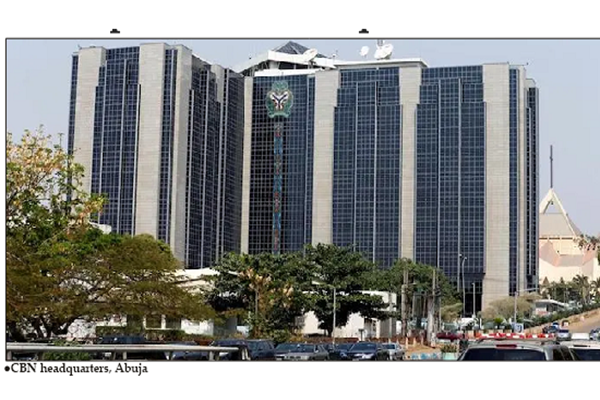CBN Turns the Corner, Reports ₦165 Billion Profit in 2024
By Patience Ikpeme
The Central Bank of Nigeria (CBN) has announced a robust profit of N165 billion for the 2024 financial year.
This marks a dramatic recovery from the substantial N1.3 trillion deficit recorded in the preceding year, signaling a marked improvement in the apex bank’s fiscal health and the effectiveness of recent economic policies.
The CBN’s financial resurgence, detailed in its latest financial statements, stems primarily from successful expenditure control measures, profitable investment activities, and increased earnings from foreign exchange transactions.
This positive shift offers a more stable foundation for the central bank to execute its core responsibilities of maintaining price stability and fostering sustainable economic growth for Nigeria.
Adding to the positive economic indicators, Nigeria’s External Reserves witnessed an increase, rising from $36.6 billion in 2023 to $38.8 billion by the end of 2024. This growth is largely attributed to stronger inflows from portfolio investors, increased diaspora remittances, and improved Federal Government receipts, facilitated by enhanced collaboration with the Nigerian National Petroleum Company (NNPC) and targeted engagement with Nigerians abroad.
Prudent management of the Bank’s investment portfolio also played a crucial role in bolstering these reserves. A healthier external reserves position strengthens Nigeria’s ability to meet its international financial obligations, supports the stability of the Naira in the foreign exchange market, and enhances overall confidence in the nation’s macroeconomic outlook.
Further analysis of the CBN’s financial statements reveals a notable contraction in its Loans and Receivables, which decreased from N16.1 trillion to N11.9 trillion. This reduction is primarily a result of successful recoveries from previous intervention lending programmes and a deliberate strategic turn away from direct lending interventions and monetary financing through ways and means.
This policy adjustment aligns with the CBN’s stated intention to allow market forces to play a more dominant role in credit allocation and the broader development of the financial sector.
Operational efficiency within the CBN also saw improvements, with operating expenses being carefully managed and optimized throughout 2024. This the apex bank said reflects a conscious effort to cultivate a cost-effective operational culture within the institution. Strategic cost rationalization initiatives, including reductions in non-essential spending and streamlined operations across its various branches and departments, contributed to these savings.
In a demonstration of transparency and accountability, the CBN successfully implemented Internal Control over Financial Reporting (ICFR) in full compliance with the Financial Reporting Council (FRC) regulations. An independent joint external audit team conducted a thorough assessment and certified the effectiveness of the Bank’s internal control framework for the 2024 reporting period.
This achievement not only enhances the reliability of the CBN’s financial reporting but also strengthens its institutional governance, improves internal risk management, and aligns its practices with international standards for central bank operations.
However, the CBN’s report also indicated some areas of increased expenditure. The cost of liquidity management operations rose to N4.5 trillion in 2024, a significant increase from the N1.5 trillion recorded in 2023.
The CBN explained that this surge was a direct consequence of the more aggressive monetary policy stance adopted to combat persistent inflationary pressures. This involved more frequent and larger-scale Open Market Operations (OMO) aimed at mopping up excess liquidity in the financial system, a process that incurred substantial costs.
The Bank also noted that in many other countries, these liquidity management expenses are typically borne by the government, rather than the central bank.
Additionally, the CBN experienced an increase in losses on settled derivative contracts, rising from N6.3 trillion in 2023 to N13.9 trillion in 2024. The Bank clarified that this increase was due to the settlement of a high volume of existing derivative contracts, which were legacy transactions inherited by the current management.
The CBN stated that this proactive settlement strategy, while resulting in immediate losses, is a crucial step towards reducing Nigeria’s outstanding foreign exchange liabilities, strengthening net foreign reserves, restoring credibility to the country’s forward markets, and addressing long-standing financial obligations in a transparent manner.
The CBN noted that “the improved performance in 2024 is not coincidental but a product of deliberate, and strategic management efforts. The Bank’s leadership has reinforced governance and accountability, instilling operational discipline and pursued a balanced monetary policy stance, ensuring price and financial system stability.
The Central Bank of Nigeria’s 2024 financial performance represents a notable recovery and a shift towards greater financial stability. The significant swing to profitability, coupled with improvements in external reserves and a more market-driven approach to lending, indicates a strengthening of the nation’s central financial institution.
While the increased costs associated with managing liquidity and settling past derivative contracts present ongoing considerations, the overall trajectory suggests a positive evolution in the CBN’s financial health and its capacity to support Nigeria’s economic growth and stability.




